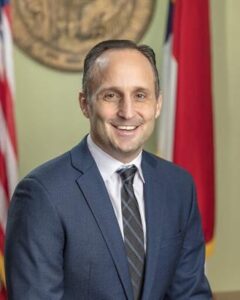- Home
- About
- Insurance
- Quote
- Dental/Health
- Service
- Notary
- News
- Referral Partners
- Agent Resources
Interested in Business Insurance?
Get automatic alerts for this topic.

[ad_1]
RALEIGH, N.C. (AP) — North Carolina’s elected labor commissioner has declined to adopt rules sought by worker and civil rights groups that would have set safety and masking directives in workplaces for future infectious disease outbreaks like with COVID-19.
Commissioner Josh Dobson, a Republican, announced Wednesday that his refusal came “after carefully reviewing the rulemaking petitions, the record, public comments, listening to both sides and considering the North Carolina Department of Labor’s statutory authority.”
His department held a public hearing in January over the proposed rules offered in December by groups such as the Episcopal Farmworker Ministry, North Carolina State AFL-CIO and state NAACP. Most of the people who spoke at the hearing opposed the proposed rules.
One North Carolina rule petitioned for focused on controlling the spread of infectious diseases among migrant workers and their dependents, while the other covered workers more broadly in various fields, The News & Observer of Raleigh reported.
The rules would have applied to any airborne infectious disease designated as presenting a public health emergency by the governor, General Assembly or other state or federal agencies. Rules would have required some North Carolina employers to create a written exposure control plan. Some exposure controls include requiring employees to maintain physical distance — following public health agency recommendations — or to wear a face mask if that was not possible.

State AFL-CIO President MaryBe McMillan said her group is “deeply disappointed by the decision” and urged the department to reconsider, citing worker deaths during the COVID-19 pandemic.
“We relied on farm workers, grocery clerks, nurses, letter carriers, and so many other essential workers to provide critical goods and services,” she said. “We cannot call workers ‘essential’ and continue to treat them as expendable.”
Dobson, in his first term, didn’t seek reelection this year. GOP nominee Luke Farley and Democratic nominee Braxton Winston will compete for the job in November.
Winston, a former Charlotte City Council member, spoke in support of the rules at January’s hearing. He said the federal government was not efficient and effective in carrying out its exposure control plans at the start of the pandemic and that the state Labor Department “must effectively quarterback should the need arise.”
Farley, who defeated three rivals in last week’s Republican primary, said Dobson’s rejection of the proposed rules “is a win for both our workers and our small businesses.”
“If you feel sick, don’t go to work. It’s that simple,” said Farley, a lawyer in construction law. “We don’t need a bunch of burdensome new regulations to address a commonsense problem.”
Several of the worker and civil rights groups had sought in late 2020 from the labor department a permanent set of COVID-19 workplace safety standards for workers. The department rejected that petition, but a Wake County judge ruled in 2021 that the agency was wrong to reject it without a formal evaluation, in line with department policy.
Nationwide, workers’ compensation claims for COVID illness turned out to be less of an issue than many initially feared. Reports show that indemnity and medical claims for front-line workers and others were not a major cost driver for employers and insurers.
Copyright 2024 Associated Press. All rights reserved. This material may not be published, broadcast, rewritten or redistributed.
Topics
Commercial Lines
Business Insurance
North Carolina
South Carolina
Get automatic alerts for this topic.
[ad_2]
Source link
Comment (0)